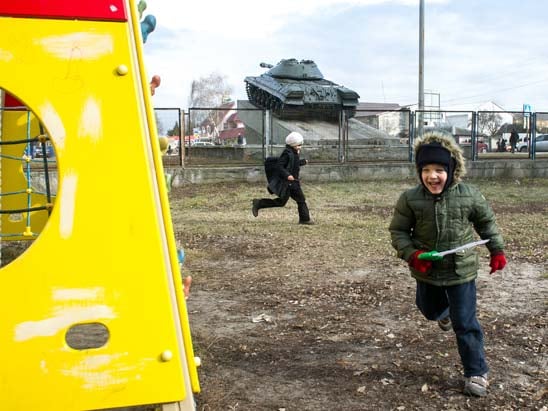
A Soviet tank mounted on a plinth outside a primary school attests to the last time the central Ukrainian town of Kagarlyk saw war up close.
The tank is a leftover from the Soviet force that routed Nazi troops from Ukraine during World War II.
More than 70 years later, tanks have again been churning up the rich black soil of Ukraine as the country's pro-Western government battles a pro-Russian insurgency.
Seen on television from the comfort of a sitting room in Kagarlyk, a depressed town around 600 kilometres (350 miles) west of the frontline, the fighting that rumbles on at a low level despite a month-old truce seems remote.
But Ukrainians across the country are paying a high price for the conflict in the industrial Donbass region, which accounts for nearly 10 percent of national output.
Maria Polyvaniuk, a 27-year-old mother of two who lives in a drab Soviet-era apartment block, has watched aghast as the nation's currency nosedived in the past year, triggering astronomical increases in the prices of imported food, clothes and other essentials.
"Before, if we had something to celebrate, like a birthday, we could go to a cafe. We also ate more meat and fish," says Polyvaniuk, a slight figure with wispy hair, describing life for a family of four on her electrician husband's monthly salary of 2,000 hryvnia in pre-war Ukraine.
That salary was equivalent to $250 a year ago, but just $87 today. "Nowadays we cook mostly simple food, like soup and rice. As for clothes, we buy less and wait for sales."
From eight hryvnias to the dollar a year ago the currency weakened to a record low of 33.75 at the end of February, overtaking the ruble as the world's worst performing currency.
The hryvnia has since rallied to 23 to the greenback, after the central bank hiked interest rates, while waiting for the International Monetary Fund to confirm a make-or-break $17.5 billion (16.2 billion euro) bailout on Wednesday.
But with year-on-year inflation running at 34.5 per cent in February, the purchasing power of most Ukrainians is rapidly eroding.
Well-stocked shelves
Polyvaniuk's mother-in-law, a smiling woman with ruddy cheeks who has endured several bouts of hardship since the breakup of the Soviet Union, contrasts the situation with the mid-1990s when inflation hit 10,000 percent.
"Back then the shops were empty. This time there are things to buy... if you have the money," 64-year-old Lyubov Yemets remarks. In Kiev, where some people have negotiated salaries pegged to the dollar or euro, the money is there for some things.
Bars and restaurants still do a brisk business -- as did flower sellers on International Women's Day at the weekend. But car traffic has thinned after a spike in petrol prices, and upscale shops are glaringly empty.
"No business: hryvnia very low, dollar very high," says Sergiy, a Kiev vendor of Ukrainian flags, Russian fur hats and other souvenirs, spreading his arms to denote the widening chasm.
Slabs of Italian cheese costing more than a month's salary have come to symbolise the currency crisis, but the prices of locally produced staples such as sugar and cooking oil have also soared because of rising transport costs.
At a Kagarlyk supermarket, an old woman could be seen spending long moments peering at the prices of litre bottles of cornflower oil before eventually opting for a half-litre.
Another IMF bailout
With the country of 43 million teetering on the edge of a default, help cannot come quickly enough.
Gross domestic product contracted 7 per cent last year, and Ukraine faces another 5.5 per cent shrinkage in 2015.
The promised IMF loan is the cornerstone of an international aid package that is expected to exceed $40 billion over four years. It comes with strings attached, however.
Last week, Ukraine's parliament adopted a series of reforms on which the IMF conditioned the aid, including a cut to pensions, a threefold hike in household gas prices and efforts to combat corruption.
For Olena Bilan, chief economist at Ukraine's leading investment bank Dragon Capital, the reforms, while "painful", are long overdue. "Only those who are really in need will be supported from the budget," Bilan told AFP.
So far, people seem to be accepting the necessity of the austerity pill, but that could change if the war drags on. President Petro Poroshenko this week called on the nation to "look truth in the eye" and stay united.
"As long as there is war there will be no investment in Ukraine, and people must be told the truth," he said in an interview Monday.
Asked whether she expected a lasting peace anytime soon in a conflict that has killed more than 6,000 people, Yemets replied with an emphatic "nyet".
Track Latest News Live on NDTV.com and get news updates from India and around the world

